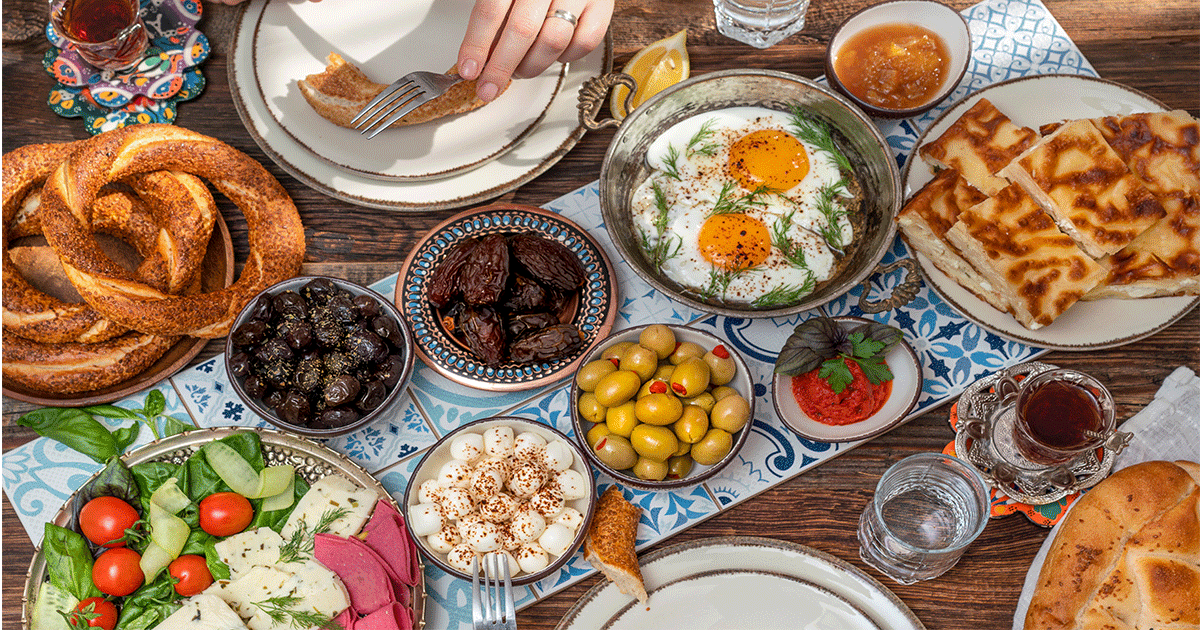While Iftar meals are often a time for celebration, it’s important not to go overboard while eating during this important period. Here are some healthy tips to follow during Ramadan!
TIP 1: STAY HYDRATED
- Drinking plenty of fluids, as well as consuming fluid-rich foods, such as fruits, vegetables, yogurt, soups and stews, is very important to replace fluids lost during the day and to start the next day of fasting well hydrated.
- Drink as much water as possible between Iftar and bedtime so that your body may adjust fluid levels in time. Aim for 8 glasses by bedtime.
- During the evening hours, resist the temptation to drink tea, coffee, and carbonated fizzy drinks as they will dehydrate you very quickly
- Salt stimulates thirst and so it’s a good idea to avoid consuming a lot of salty foods.
TIP 2: AVOID CONSTIPATION
The changes in eating habits and the lack of fluids during the day may cause constipation for some people. The recipe to alleviate this is: Fibers + Fluids + Physical activity!
When you can eat and drink, make sure you consume plenty of high fiber foods, such as whole wheat, grains and seeds, bran-containing foods, fruits and vegetables, beans and dried fruits alongside plenty of fluids.
Stay active: Light exercise, such as walking for 20-30 minutes, is best done in the evening hours.
TIP 3: REPLENISH YOUR ENERGY LEVELS
Remember that you only have a relatively short time each day to eat and drink to provide your body with all the essential nutrients and fluids it needs to be healthy, so the quality of your diet is especially important during Ramadan.
Dates are a great way to break the fast as they provide natural sugars for energy, provide minerals like potassium, copper and manganese and are a source of fiber. You could also try other dried fruits such as apricots, figs, raisins or prunes, which also provide fiber and nutrients.
For Iftar, ensure you eat plenty of tasty salad greens and vegetables to go with your main meal. By ensuring at least half of your plate is full of healthy nutrients, you’ll get the energy and vitamins you need. Remember to eat your veggies first!
In view of the long hours of fasting, you should consume slow digesting foods including fiber containing-foods rather than fast-digesting foods.
The pre-dawn meal, Suhoor, provides fluids and energy for the day of fasting ahead, so making healthy choices can help you to cope better with the fast (favor complex carbohydrates so that the food lasts longer making you less hungry.
TIP 4: MANAGE INDIGESTION
Heartburn and discomfort are common feelings during Ramadan however they can be simply avoided by adapting the following general guidelines:
- Eat slowly
- Avoid big meals
- Stay away from fried foods
- Go easy on spices
TIP 5: BEWARE OF OVER INDULGENCE
After a long fast it’s natural to want to treat yourself but try to keep the amount of fatty and sugary foods and sugary drinks you have to a small amount.
Although very tasty, appetizers like sambousek and fatayer and Ramadan desserts are the main reason for putting on weight during this period. Therefore try to stay away as much as possible from those foods and whenever you want to have some, choose low fat low sugar choices (baked appetizers instead of the fried ones, sugar free syrup instead of regular syrups, and grilled kellaj instead of the fried one….)
Serve yourself and your family a “dessert” of fresh fruit and nuts. There are lovely choices available in this season, and they are much healthier than Arabic sweets and chocolate.



